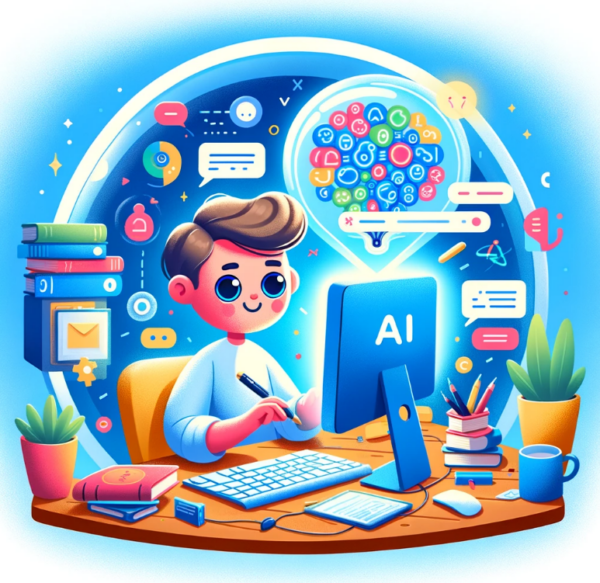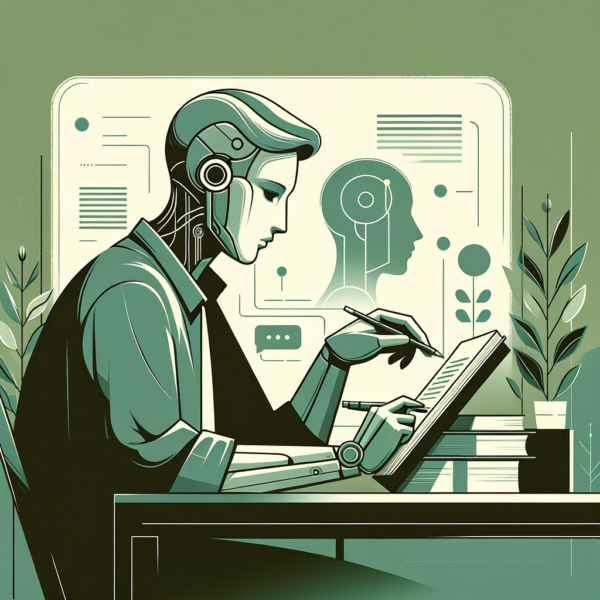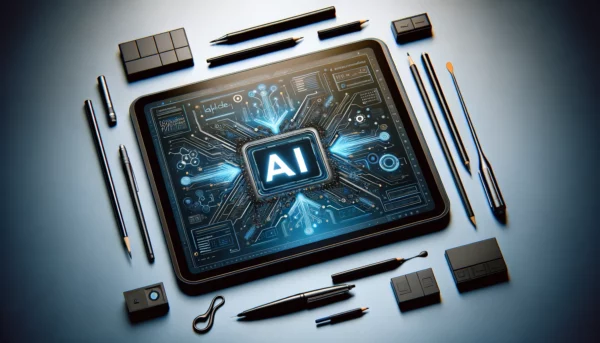Remember the days when publishing a book felt like climbing a mountain? Hours spent on editing, countless revisions, and the long wait for your manuscript to finally see the light of day. Well, those days are fading fast. The birth of Artificial Intelligence (AI) is revolutionizing the publishing industry, bringing unprecedented speed, efficiency, and precision to every step of the process.
AI isn’t just a fleeting trend; it’s a game-changer that’s transforming how books are created, marketed, and distributed. To put it in perspective, AI expert Kai-Fu Lee has said, “I believe AI is going to change the world more than anything in the history of humanity. More than electricity.” And he’s not exaggerating. From designing eye-catching book covers to refining the editing process and optimizing global distribution, AI is streamlining tasks that once took months to complete.
In this article, we’ll explore how AI is reshaping the publishing world, offering countless benefits while also addressing the risks of ignoring this digital revolution. As we delve into the many ways AI publishing is enhancing the process, one thing is clear: the future of book publishing isn’t just on the horizon—it’s already here.

How is AI Redefining the Book Publishing Landscape?
AI is transforming every aspect of book publishing, from editing and cover design to distribution and marketing, making the process faster, more efficient, and cost-effective. For example, McKinsey & Company reports that AI can reduce publishing timelines by up to 50%. This speed is complemented by AI’s impact on editing and proofreading, where efficiency has improved by 35%, according to the Association of American Publishers. This leads to fewer errors and smoother narrative flow, enhancing overall reader satisfaction.
Enhanced Cover Design
AI tools revolutionize cover design by analyzing a book’s script to generate a wide array of options that capture the story’s essence. Authors now have the luxuory to choose from these AI-created designs, tailored to their book’s theme and style. It deosn’t end with the front cover, but rather extends to crafting the spine and back cover, ensuring visual coherence as welll as generating engaging blurbs and author bios.
This approach by AI not only simplifies the design process but also guarantees that every element of the book’s cover resonates well with the reader, making a great first impression.
Your Publishing Journey Awaits – Start NowAdvanced Formatting
Formatting a book can be a time-consuming and tedious process, requiring meticulous attention to detail. Now, the automation of text and image layout, consistency across pages, and adaptation of formats for various publishing platforms, including e-books and print, is handled by AI. This automation not only saves significant time but also ensures a professional, reader-friendly layout, enhancing the overall reading experience. By streamlining these tasks, AI allows authors and publishers to focus more on creative aspects rather than technical formatting challenges.
Refining Editing and Proofreading
The traditional process of editing and proofreading, once a time-intensive, meticulous, and costly task, is being transformed by Artificial Intelligence. AI-powered tools have emerged as indispensable assets for publishers and authors alike.
AI transforms the editing and proofreading process by surpassing basic grammar checks and analyzing sentence structure, tone consistency, and narrative flow. These tools adapt to various genres and styles, ensuring each work maintains its unique voice while adhering to high linguistic standards. The speed and precision of AI reduce the likelihood of human error, catching inconsistencies and mistakes that might be overlooked by human editors.
While AI significantly streamlines and improves the editing process, the final review by a human editor is essential to catch nuances or errors that AI might overlook. This blend of AI efficiency and human expertise makes the process more precise and efficient than relying solely on human effort, saving a considerable amount of time and enhancing the overall quality of the work.
Optimizing Global Distribution and Marketing
Marketing your book can be a challenging and complex endeavor, often requiring extensive resources to effectively reach the right audience. AI revolutionizes global book marketing and distribution by providing deep insights into market trends, reader demographics, and purchasing behaviors through AI-driven analytics. These AI algorithms assist in optimizing distribution channels which enables publishers to target specific audiences worldwide, tailor marketing campaigns to diverse cultural contexts, and optimize distribution channels. As a result, books reach the right audience at the right time, maximizing their global reach and impact. AI’s precision and speed make marketing more effective and less labor-intensive, transforming the traditional publishing landscape.
From creating captivating covers and streamlining formatting to refining editing and optimizing global marketing, AI is not just enhancing the traditional publishing process—it’s pioneering a new, more efficient landscape where creativity meets cutting-edge technology.

The Benefits and Changes Brought by AI Publishing
The integration of AI in publishing is not just a technological advancement; it’s a paradigm shift bringing substantial benefits to book production and transforming the industry.
Enhanced Efficiency and Speed
One of the most notable benefits of AI publishing is the significant enhancement in efficiency and speed. Traditional publishing processes are notoriously time-consuming, often involving lengthy periods of editing, proofreading, cover design, formatting, and distribution.
- AI-Driven Editing: Analyzes and suggests improvements to manuscripts much faster than human editors.
- Automated Layout Design: Formats text and images according to preset standards, reducing time and cost.
- Creative Focus: Frees up human resources for more creative and strategic tasks.
Cost Reduction
AI’s efficiency in book publishing directly translates to cost reduction across various stages.
- Lower Labor Costs: Reduces the need for extensive human labor by handling tasks like grammar checks, layout design, and cover creation.
- Error Minimization: Reduces costly errors in the publishing process.
- Efficient Marketing: Analyzes reader preferences to target the right audience and build effective campaigns, reducing marketing expenditures.
AI Audiobook Generation
AI is revolutionizing audiobook creation by generating high-quality audiobooks swiftly and accurately, a process that traditionally required a professional narrator and extensive editing. This efficiency not only speeds up production but also significantly reduces costs. Today’s AI technology ensures minimal adjustments, maintaining high standards and making it a viable alternative to traditional narration.
AI-generated audiobooks are expanding the reach of literature, catering to the modern preference for audio content. This shift opens up a broader audience, increasing potential sales and readership, making literature accessible to those who prefer listening while on the go.
- Speed and Cost Efficiency: Generates audiobooks swiftly and accurately, reducing production time and costs.
- High Quality: Ensures minimal adjustments during the proof hearing process.
- Expanding Reach: Caters to modern preferences for audio content, opening up a broader audience for books and increasing potential sales and readership.
Data-Driven Decisions Enhanced by Advanced Royalty Management
One of the most significant advancements in AI publishing is the ability to make data-driven decisions, especially in royalty management. Sophisticated systems now streamline the tracking of royalties from multiple distribution channels into a single platform, ending the cumbersome process of navigating various reports.
Your Publishing Journey Awaits – Start NowThese systems provide clear, organized views of distribution, sales and royalties, saving substantial time and effort. Authors and publishers gain full access to comprehensive financial insights, making the process more efficient and transparent. This leap forward ensures a thorough understanding of financial performance across different markets and channels.
- Streamlined Royalty Tracking: Tracks royalties from multiple distribution channels on one platform, eliminating the need to navigate various reports.
- Clear Financial Insights: Provides an organized view of distribution, sales, and royalties, simplifying earnings analysis.
- Comprehensive Financial Understanding: Offers insights into financial performance across different markets and channels, saving substantial time and effort.

5 Key Risks of Ignoring AI in Publishing
In a world increasingly driven by technology, resisting AI in publishing is akin to the early skepticism about mobile phones. Just as mobile phones have become indispensable, AI offers significant advantages that can’t be ignored.
1 – Slower Production Times: Traditional vs. AI Publishing
Traditional publishing methods typically span 6 to 12 months due to manual tasks like manuscript editing, layout design, and market analysis. According to a report by PwC, delays in production can lead to a 30% reduction in market competitiveness.
Such prolonged timelines can be a major setback, especially in a dynamic market where capitalizing on current trends or reader interests is crucial. The timely release of content is often key to a book’s success. In stark contrast, AI integration into publishing dramatically accelerates these processes. With the use of AI tools, the time taken to publish a book can be reduced to less than 30 days!
This enhanced efficiency is a game-changer, ensuring that books are not only published faster but also more in sync with market demands and reader expectations. AI’s ability to streamline the publishing process revolutionizes how quickly books can reach the market, offering a significant competitive edge in the fast-paced world of publishing.
2 – Higher Costs and Resource Intensive
Without AI, the publishing industry relies heavily on human labor, escalating costs for editing, designing, formatting, and distribution. Traditional methods are resource-intensive, increasing overall expenses to bring a book to market. The absence of AI means extended timelines and higher labor costs, as more manpower is required to manage and correct errors.
AI streamlines these processes, cutting expenses and boosting efficiency. By automating tasks, AI reduces labor costs and shortens production time, ultimately lowering the overall expenditure and making the publishing process more cost-effective and efficient.
3 – Risk of Human Error
Manual processes are prone to errors in editing and layout, affecting the quality of the final product. Traditional publishing, without AI, is more susceptible to grammatical errors, inconsistencies, and layout issues. Additionally, human-led distribution can miss important data, leading to less effective marketing strategies.
AI minimizes these risks by processing vast amounts of data with precision. It ensures higher-quality output by identifying patterns and correcting errors that humans might overlook. This precision significantly reduces errors, enhancing the overall quality and effectiveness of the publishing process.
4 – Reduced Accessibility
AI can enhance accessibility features, such as audiobooks and e-books, making content available to a wider audience. Without AI, expanding these accessibility options can be more labor-intensive and costly.
5 – Limited Scalability
Without AI, scaling operations can be challenging. Human labor limits the number of projects that can be managed simultaneously, potentially stunting growth and reducing the ability to meet increasing market demands.
Failing to integrate AI into your publishing process can result in significant operational inefficiencies and leave you trailing behind the competition. In 2024, being an author is about more than just putting words on a page – it’s about staying ahead in a rapidly evolving industry. Ignoring AI tools could mean longer publishing timelines, lower-quality output, and missed opportunities for efficiency.
After all, why spend months on tasks that could be streamlined with technology? Don’t let outdated methods turn your book into a snail’s pace project – embrace AI, and let it propel your publishing journey to the next level.

AI Publishing: Start Your Publishing Journey with Spines
Embark on your AI publishing journey with Spines, where cutting-edge AI technology meets the irreplaceable touch of human expertise. At Spines, we harness the power of AI to revolutionize the publishing process, ensuring accuracy, efficiency, and a personalized experience tailored to each author’s unique needs.
Spines is not only revolutionizing traditional publishing but also empowering self-publishing authors. Our platform streamlines every step of the content production process, from proofreading and formatting to designing an eye-catching front cover, making your AI publishing journey smoother and more effective.
Choosing Spines means embracing a future where new technology amplifies human creativity. Our technology provides unparalleled precision in editing, while our team of experts ensures that your book retains its authentic voice and vision. This synergy results in a high-quality, market-ready product that stands out in the competitive world of publishing.
Click here to start your publishing journey for free and join us in shaping the future of publishing, where your next idea or story meets innovation.








